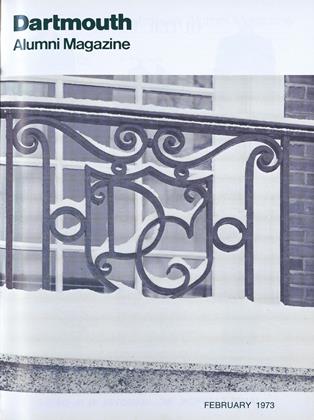In these days when newspapers, magazines, books and TV are filled with series about freed and enslaved women. Pocket Books opportunely offers the public for $1.25 some 291 pages about what happened to a number of Greek women. Richmond Lattimore '26, co-editor, writes in his introduction of Euripides: Four Plays aboutWomen that Euripides "wrote shockers, and that Euripides asks such questions as: (1) What does it feel like to have your wife die for you?" and (2) " What does it feel like to have murdered your mother?" He points out that Euripides treats "the weak and oppressed, the despised and misunderstood: Women "In the plays they outnumber the men, and most of the choruses are female, who often do not get interrupted or seriously challenged, perhaps because at times their listeners do not listen. Fascinated by women, Euripides is neither "for" nor "against" them; he merely tries to present action from their point of view The translators provide useful introductions to each of the four plays. Mr. Lattimore, Paul Shorey Professor of Greek, Emeritus, at Bryn Mawr College, is responsible for Helen and TheTrojan Women; Rex Warner, for The Medea; and Emily Townsend Vermeule, for Electra. All relevant? Commonweal says yes: "A notable achievement ... scrupulous scholarship, poetic genius... the critical commentaries are fresh, unpretentious, and, above all, functional.
David H. Blake '61 is Special Editor of TheMultinational Corporation, a symposium of 250 pages, published September 1972 under the auspices of The Annals of the American Academy of Political and Social Science. A labor arbiter for the steel industry, he holds the position of Associate Professor in the Graduate School of Business and Department of Political Science at the University of Pittsburgh. In his preface he points out that, specifically and generally the multinational corporation has been an agent for change. Each of the many contributors examines the changes stimulated by the internationalization of business, makes predictions about future changes, and outlines resulting responses. The central theme is the impact of the multinational corporation on the industrial system, the nationstate, and the international economic and political systems. Discussed also are potential conflicts and benefits for advanced industrial and developing countries, and the impact of the United States multinational corporations on American foreign policy. Mr. Blake also contributes an article about the strategies and tactics of trade unions as they attempt to counteract the advantages of multinational corporations. The second section of the publication offers reviews of books about Africa, Asia, Latin America, Europe, and the United States and also about sociology, politics, economics, and international relations.
"Problem: Given a piece of land 12 cubits by 10 cubits, determine its area. Since the piece of land is a rectangle, the area can be simply attained by the multiplication of 12 by 10. The scribe, however, wishing to demonstrate a method of dealing with a foursided area of unequal sides, adds opposing sides together, halves the total, and multiplies the halves. . . . This formula is well known from other sources, such as the land donations to the temple of Edfu (Brugsch, Thesaurus, pp. 538-603), and land measurements recorded on ostraca (A. H. Gardiner, H. Thompson, and J. G. Milne, Theban Ostraca, pp. 42-43). . . . The result, 120 square cubits, is also formulated at 1 1/5 land cubits."
This is a quotation on page 71 of a $25 dollar book, Demotic Mathematical Papyri, published by the Brown University Press and written by Richard A. Parker '30, since 1948 Wilbour Professor of Egyptology at Brown. The chronicle of the present volume, possible only after a lengthy investigation involving help from leading scholars in England, France, Denmark, the United States, and Egypt, began in the summer of 1957 when, searching in the demotic papyri of the Griffith Institute for anything of astronomical interest, he found his first fragment of a mathematical text. Since then he has worked in the Cairo Museum and the British Museum. An introduction describes the physical state of the papyri (12 pages). Problems are stated and discussed (pp. 13-77). The index of Egyptian words with selected palaeography and a selection of numerals involves eight pages. Then follow 25 fold-over plates of the papyri.
Edward M. Holmes '33 has been honored with an Emily Clark Balach Award for his "Drums Again," which appeared in Best Short Stories of1972, published by Houghton Miffllin Company. He is also author of Driftwood, stories about Maine, 69 pages, published by the Puckerbrushi Press of Orono.
 View Full Issue
View Full Issue
More From This Issue
-
 Feature
FeatureDartmouth Gives Its Name to U.S.—Soviet Understanding
February 1973 By ROBERT B. GRAHAM '40 -
 Feature
FeatureTrustees and Alumni Council Meet
February 1973 -
 Feature
FeatureThe Making of a Mural
February 1973 By GOBIN STAIR '33 -
 Feature
FeatureToujours jeunes pour les voyages
February 1973 By IRA BERMAN '42 -
 Feature
FeatureDartmouth Alumni College
February 1973 -
 Article
ArticleFaculty
February 1973 By ROBERT B. GRAHAM '40














